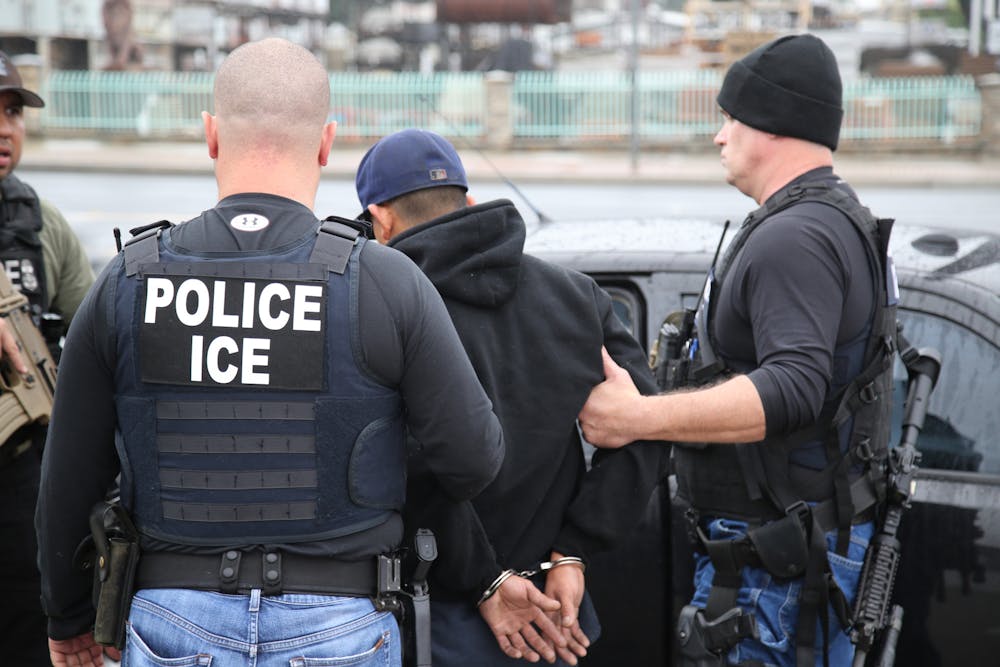By Fiona Espinoza-Castro
Staff Writer
During President Donald Trump’s first week in office, Americans witnessed federal immigration enforcement intensify under his administration. The effects of his administration’s policies have been felt on local ground in Newark, New Jersey, where the business Ocean Seafood Depot was targeted. U.S. Immigration and Customs Enforcement agents were seen rounding up both undocumented immigrants and American citizens, Reuters reported.
This unexpected raid has sparked controversy for Trump, while Newark mayor Ras Baraka has been praised for his policies protecting migrants, particularly in response to Trump’s immigration plan. Baraka said that the ICE raid violated citizens’ constitutional rights, citing the arrest of a U.S. military veteran who was humiliated after being questioned over the legitimacy of his military documentation.
Typically, immigration officers are allowed to enter public areas of businesses. However, according to the Federal Law Enforcement Training Center, when accessing non-public areas, ICE must have a valid and signed warrant or the direct owner’s permission. In a statement, Baraka expressed that the state of Newark “will not stand by idly while people are being unlawfully terrorized.”
Amy Torres, executive director of the New Jersey Alliance for Immigrant Justice, stated that, according to the employees, ICE agents abruptly entered the business armed and blocked off entrances, delivery ramps and exits. The agents also banged on bathroom doors, all without presenting a warrant, NBC News reported.
Beyond Newark, ICE has been raiding major U.S. cities, including Los Angeles, Philadelphia, New York City and more. However, according to the Colorado Public Radio, an ICE raid planned for Aurora, Colorado, was postponed due to extensive publicity. Officials have not released accurate information that would help distinguish migrants with criminal records from those who are law-abiding or have permits, according to NBC.
Throughout Trump’s campaign, he prioritized the deportation of migrants with criminal records. Yet, despite this, a majority of arrests have been made in workplaces, targeting undocumented individuals who, according to Baraka, were not rapists, murderers or criminals.
White House Press Secretary Karoline Leavitt posted on X, claiming that the 538 people arrested by ICE were criminals, including Tren de Aragua gang members, a suspected terrorist and some with criminal records of sexual assault.
“Some of the tactics could very well make us less safe, for instance, by making people in our communities fearful of coming forward and reporting crimes,” New Jersey Attorney General Matthew J. Platkin said, according to NBC News.
This crackdown comes after President Trump’s executive order signed on Jan. 20, “PROTECTING THE AMERICAN PEOPLE AGAINST INVASION,” addressing immigration within the United States. This directs the Department of Homeland Security to expand detention infrastructure and detain immigrants deemed fit for deportation, according to Vera. DHS Secretary Benjamine Huffman declared two directives that the administration considers essential to end the country’s immigration problem.
According to the Department of Homeland Security, the first directive calls for the rescinding of the Biden Administration’s guidelines for ICE and demands that Customs and Border Protection should expand their search to include “sensitive” areas such as schools and churches.
Meanwhile, the second directive stated that there has been an abuse of the humanitarian parole, claiming that the previous administration allowed 1.5 million immigrants into the U.S. Moving forward, the program will return to its original purpose of evaluating immigrants on a case-by-case basis, DHS stated.
Under the Biden administration, “collateral arrests” were banned, PBS reported. ICE and CBP will now begin phasing out parole programs deemed unnecessary — “no one has a free pass anymore,” especially after the Laken Riley Act was passed.
Laken Riley’s case involved a Venezuelan migrant, and fueled scrutiny around parole programs such as Venezuela’s Temporary Protection Status and the CBP One application. Despite Alejandra Mayorkas extending Venezuela’s TPS status for another 18 months, his successor, Kristi Noem chose to erase the program, not wanting Venezuelan migrants to “violate our laws,” reported El País.
The CBP One application allowed hundreds of thousands of Nicaraguans, Haitians, Cubans and Venezuelans to enter legally under an economic sponsor. However, Trump intends to revoke their legal status completely.
In a shocking move, Trump has declared that a mass detention camp is set to house deportees at Guantánamo Bay, Cuba. It will be used to hold 30,000 migrants who Trump describes as “the worst criminal illegal aliens threatening the American people,” according to the Washington Post. Trump further stated that some migrants are so dangerous that the U.S. does not trust other countries to detain them, making Guatánamo Bay the ideal location due to its inescapable location.
According to the New York Times, Guantánamo Bay would only hold a fraction of the millions of migrants President Trump hopes to deport, and it would come at a high cost to operate. The Cuban government has also voiced concerns, stating that holding 30,000 migrants would create a “scenario of risk and insecurity.”
Additionally, detaining deportees before sending them to other countries presents diplomatic challenges, as deportation requires a mutual agreement and extensive negotiations. The New York Times reported that some countries can block deportation flights from landing, refuse to issue travel documents or decline to acknowledge deportees.
Two hundred Colombians were recently deported, despite not having criminal records. Colombia’s foreign minister, Luis Gillberto Murrilo, responded by stating that “being a migrant is not a crime.”
While Colombia typically accepts deportation flights, the Washington Post revealed that the country denied entry to two U.S. military plans, after officials declared that deportations should be carried out with respect for the individuals involved. This has highlighted the diplomatic challenges and the political tensions arising from such deportation practices.







